#osr
Text
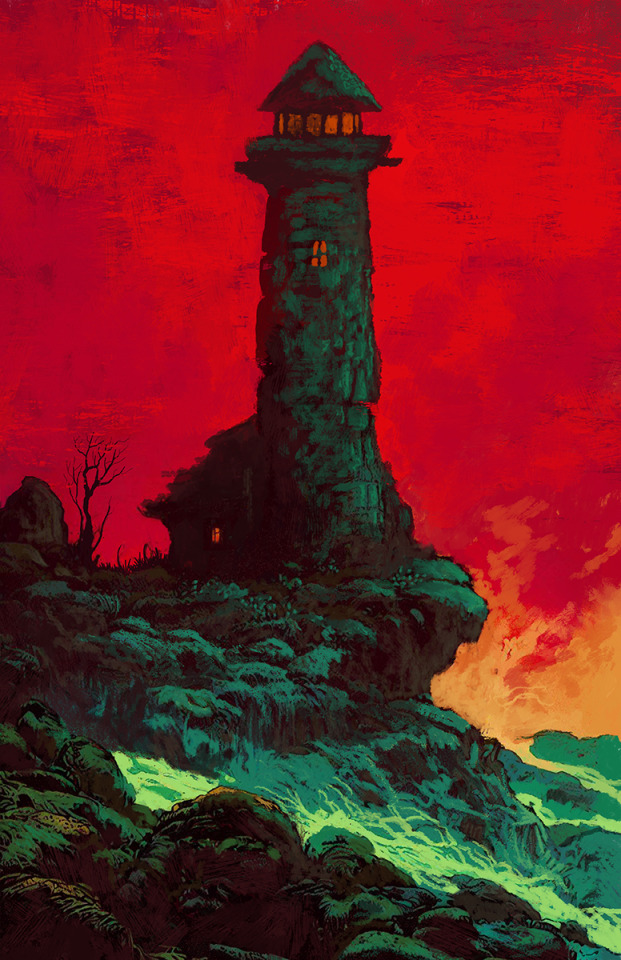
Lighthouse illustration for a ttrpg book I'm working on.
#lighthouse#illustration#mnart#fantasy art#d20#dungeonsanddragons#concept art#landscapepainting#art#haunted house#ghosts#osr#ose#retrod&d#dugeonmastersguide#dungeon#dungeonsynth
6K notes
·
View notes
Text
Announcing: Restful Actions
(It's here. You can go get it now!)
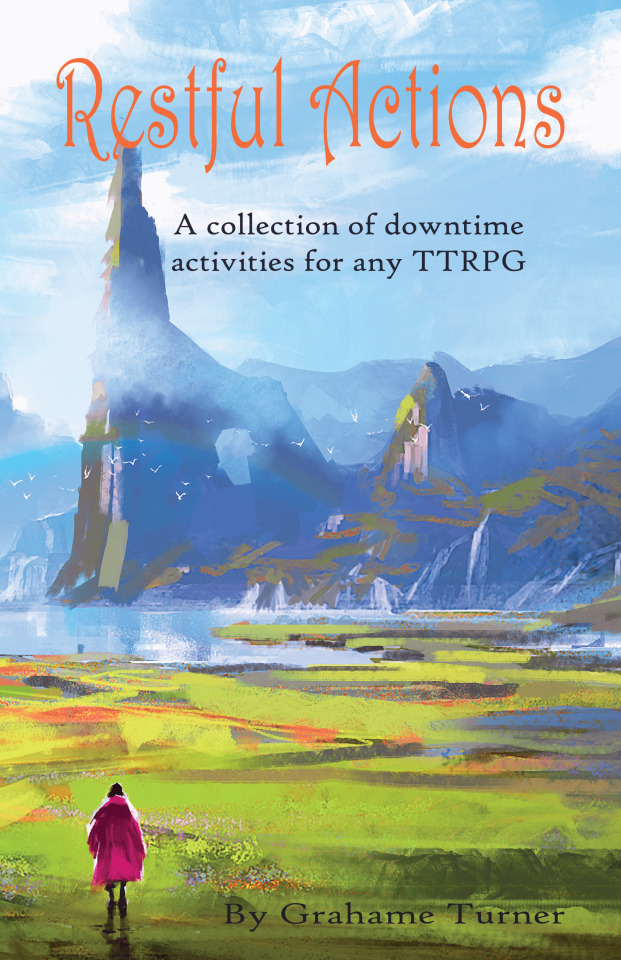
Restful Actions is a collection of 10 minigames for downtime periods in any TTRPG. They're designed to help players resolve character conflicts, complete goals, heal or explore, and take much shorter shopping trips. (You can, in fact, download the shopping trip minigame as a demo!)
For GMs, the goal is to give you a break, so you can start preparing the next Big Event. The minigames invite players to fill in some details of the world, creating shops, landmarks, even creatures.
You can pick up your copy here:
I've talked about this thing in more detail here:
#understory games#indie ttrpg#ttrpg dev#ttrpg design#ttrpg#ttrpg add on#system agnostic#scifi rpg#fantasy ttrpg#dnd#indie ttrpgs#down we go#rpg#rp#osr#osr RPGs#ai is a plague
1K notes
·
View notes
Text

Tired of not having enough frogs for your adventures?

Wish your frogs were bigger and deadlier?

Friend, I’ve got just the thing for you.

The Frog Supertable comes with:
12 original giant frogs ranging from flying to fire-breathing
3 original froggy magic items
2 tables of flavor to spice up the frogs in your game
Alternate versions for CRACK! and Cairn
Art by @evlynmoreau-blog and @whereischaosprincess
Print copies of the Cairn version are now available
You can pick up the plain text of the table for free or a pamphlet version with art for $2 over on my Itch.io page:
2K notes
·
View notes
Text
I wanna talk a little about something I've been noodling with in Stampede Wasteland. Rules that are impossible, or only exist as a sort of absence of something else?
Let's take a look at a part of generating Settlements:
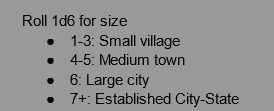
The first step is figuring out how big the Settlement is by rolling 1d6. You'll probably notice that there's a result for if you roll a seven or higher. Now, unless you have a very special d6, you're not gonna get that result.
So what's the point of putting that result there in the first place? Well, how I'd interpret it at the table is that these City-States exist, but you're not going to be encountering them randomly while exploring the Wastes. Maybe there's another way to travel to these fabled City-States? Maybe that turns into the foundation for an adventure. Maybe the table actually decides that City-States don't exist anymore; something wiped them off the map. Maybe the table has come up with a way to get a bonus to that d6 roll based on the rulings they've been establishing. It could mean any number of things!
I think this works in this sort of game, partially because the rules are relatively minimal. And in a more minimal ruleset, sometimes you have to slow down and read between the lines and try and come to your own conclusions on how things work. This is, to me, very different from something being incomplete, but it could be a fine line.
If this were something like a Forged in the Dark game, this sort of absence might feel more like an oversight, but in the sorta-OSR sphere, expectations are a little different. It's interesting to think about.
The other example of this sort of idea crops up in the travel rules. There's three options for traveling the Wastes; by foot, by steam-crawler, and by airship.
Here are the rules for airship travel:

That's it. You know from reading that line that airships exist and people can use them to travel. But for whatever reason, getting passage on them is so far out of reach of the PCs that it may as well be impossible. It reveals something about the game's world, and how it operates.
Just like the City-State rule, airship travel could also spark adventures at the table. What would it take to get a ticket for an airship? What kind of people travel by airship?
I dunno! I think it's an interesting space to play around in. Exploring the space where rules and mechanics meet the world of the game, and the space that that opens up for the table to interpret those rules. Or something like that.
505 notes
·
View notes
Text
Introduction to the OSR
what's an OSR? it's a game that's kinda like old-school D&D. or is old-school D&D. or is compatible with old-school D&D. an OSR game generally has some or all of the following principles:
low character power with highly lethal combat. in old-school D&D a 1st-level fighter has d8 hit points and a longsword does d8 damage, and you die at 0HP. this is not to ensure characters die all the time but to emphasize the next bullet point:
emphasis on creative problem solving. most situations cannot be solved by straightforward use of your abilities (such as charging into every situation with swords drawn, if a fighter), so the game tests lateral, outside-the-box thinking.
emphasis on diegetic progression. spells are found, not obtained automatically on level-up. you get XP by finding gold more than killing monsters. most of your cool abilities come from magic items. making alliances & hiring followers is encouraged.
focus on managing inventory, resources, risk, and time. the players are constantly faced with meaningful decisions; this is the heart of the game.
very sandbox-oriented. the focus on creative problem solving means the game must be accommodating to players taking a course of action the GM didn't plan for. use lots of random tables to generate emergent story. some elements of new simulationism.
high tactical transparency, i.e., the optimal course of action is rarely system-specific, and ideally very possible for a new player to intuit.
usually semi-compatible with old D&D, but not always. usually rules-lite, but not always.
what does the OSR mostly NOT do?
focus on character builds. these change the focus too much to be on the rules than the fiction, can create situations where stuff everyone should be able to do is an ability locked to one class, and impede tactical transparency.
resolve everything with a die roll. combat uses dice to be scary, unpredictable and most importantly not your default course of action. everything else should bring up dice rarely - dice are your plan B when your plan A fails. the best plans need no dice.
use linear storytelling or put players into a writer/GM role. linear storytelling gets in the way of the decision-making so core to the playstyle; letting players write details into the setting is mutually exclusive with them discovering it.
rules for everything. 400 pages of crunch is worse at simulating a believable world than the GM and players' shared understanding. OSR games rely constantly on GM ruling.
mostly still applies to all the above. making your system a "pure" OSR game comes second to doing what's best for your game.
System recommendations
old D&D or a retroclone
old-school D&D - or old school essentials or basic fantasy or swords & wizardry, which are old D&D's mechanics repackaged with quality-of-life tweaks (and the upside of not giving WOTC your money) - are usually the go-to when recommending someone's first OSR game. they're actually not my first pick, though!
PROS:
very complete, with more robust rules than a lot of the lighter games on this list.
100% compatibility: most OSR adventures are statted for old school essentials. converting them to other OSR systems is usually simple, but not 1-for-1.
easier to find games for. anyone interested in the OSR space knows what old school essentials is.
CONS:
jank. these games largely still have weird saves, level limits for non-humans, some still have descending AC, etc etc. it's not that bad but it is there
i hate thief skills. lots of essential dungeoneering actions are locked to the thief class as abilities, with abysmally low success chances. this is stuff i prefer being handled without a roll. thieves in this system suck and make everyone else worse at dungeon crawling by existing.
there's just lots of really cool shit in other systems i'm about to go into that you just don't get here
Knave 1e and its various hacks
this is a 7-page super-lightweight system that boils everything down to just the essentials.
rolling a character takes like 5 minutes. roll stats, roll gear, roll traits, go. done. it's great.
characters are defined entirely by stats and gear, no classes. wanna be a fighter, have high strength and carry a big sword and armor. wanna be a wizard, have high intelligence and fill your inventory with spells. item slots are elegant and pretty limited.
initiative is instant: roll d6. 1-3, monsters go first. 4-6, PCs go first. swingy, but god it is so smooth and shaves like the most boring 5 minutes off of every combat
monsters are so very elegant. old D&D gives monsters a "hit dice" rating to determine their HP, e.g. a 3HD monster rolls 3d8 for hit points. knave takes this number (HD) and uses it for attack rolls and saves (aside from exceptionally bad/good saves), so a knave statblock looks something like this.
spells are all one or two sentences long & extremely easy to remember.
7 pages is so light. i have the system basically memorized.
DOWNSIDES: there's no dungeon crawling rules (standard for meatier OSR games & something i consider essential) and no real bestiary, though the second point isn't a huge deal cause they're so easy to make. it also kinda assumes you already know how to run OSR games, so there's very little real advice or guidance.
KNAVE HACKS
knave 1e is in creative commons & comes with an editable word doc for you to publish with modifications, so there's a ton of variants (there was a spreadsheet of them somewhere, but i can't find it).
Grave is a favorite - i'm two years into a grave campaign and it's fantastic. it's a dark-souls-y version of knave with some really elegant innovations.
you have a set number of deaths before you for-reals die, as every character plays an undead as is dark souls tradition. makes it good for OSR beginners! being able to tell when you're close to your final death is really good - it lets you emotionally prepare for losing your character & raises the stakes more the more you die. (though honestly you should probably cut the number of extra deaths in half, it's super generous)
XP and gold are combined into one resource, souls. legendary creatures drop big souls you can make into magic items. this has ended up being the coolest thing in my current campaign. my players love finding powerful souls to make into magic items it's so fun
uses preset packages of stats/gear instead of knave's rolled ones, filling the role of more traditional character classes. has the wonderful side effect of not making you get stuck with low stats cause you rolled bad one time.
you have stamina equal to your empty item slots. you spend stamina on spells if you're a caster, or free maneuvers (on top of your attack at no action cost) if you're not. it's super elegant.
there's 3 classes of spells: wizardry for intelligence, holy magic for wisdom, and witch stuff for charisma. nice and intuitive.
there's a page of 50 magic items each a couple sentences long. this PDF is worth it just for the magic items.
DOWNSIDE: see the downsides for knave 1e. all still apply.
i enjoyed grave so much i made a variant of it with the dark souls bits removed (and some dungeon crawl rules added!) to use for my standard fantasy campaigns.
Knave 2e
sadly knave 2e is not purchasable yet (i backed it on kickstarter so i have access, though). but when it comes out i highly recommend it.
much larger and denser than knave 1e. it finally has dungeon crawling rules, it has GM and player guidance, everything is refined and the layout is so so nice and readable.
combat is a bit more interesting than 1e. you can break your weapon against an enemy to deal max damage. you get a free maneuver on high attack rolls.
there's rules for stuff like alchemy, warfare, building a base. it all kicks ass.
there are so many goddamn tables. i rifle through it anytime i need inspiration.
DOWNSIDES: i personally can't think of any! it's a very complete good functional system.
Mausritter
you play tiny little mice! in a world full of big dangerous things that want to eat mice. cat = dragon. you get it. what more could you want
the mouse thing is just super intuitive. you get the dynamic between you and the big scary lethal world. fantastic OSR game to introduce kids
nice and robust ruleset; nothing feels missing
tons of super nice GM stuff! faction rules, tools for rolling up hexcrawls and dungeons, plenty of tables
super clean readable layout. font isn't too small to avoid being intimidating. guidance is really nice and clear.
combat is autohit. super fast & lethal.
100% free
look mausritter is just. good. i wanna run it so bad someday
Worlds Without Number
sort of a middle ground between OSR stuff and 5e.
lots of classes, at least in the paid version. the free version comes with just the warrior, expert and mage. there's feats and more of a focus on builds than most OSR games. if you like more mechanical build variety than a typical OSR game, this is a great game for you!
extremely good multiclassing. y'know how in most games if you just mash together two classes you think are cool you'll end up with a total mess? not here! every combo is viable and works fine! easily the best multiclassing of any game i've touched
an absurd amount of GM stuff and tables. easily more than any of the other stuff i've praised for also having them. but personally i haven't dug into them as much, so i can't really comment on them
skills the way modern D&D has them. you roll dice and try to beat a target number. i don't tend to like rolled skills, but most people do, so if that's your thing WWN has them
DOWNSIDES
the layout is terrible. everything is a huge wall of text with very little use of bold text or bullet points to draw attention to the important bits. the table of contents has like 15 things in it for a 400-page book! i couldn't find any of the paid-version-exclusive classes for like a month after i bought it! looking up rules is a nightmare.
the way the default setting handles "evil races" is like an exaggerated parody of all the problematic aspects of how D&D handles it. like, it wants so bad for you to have an excuse to genocide sentient free-willed people. but at least the default setting is easy to chuck in the trash
Dungeon Crawl Classics
the goal of this system is to take all of the crazy gonzo moments people remember playing old-school D&D in their childhood and turn all of that up to 11 while cutting the stuff that doesn't add to that. i think a lot of its innovations have ended up kind of standard in newer OSR stuff (like fighters getting maneuvers with their attacks), but it still has more to offer.
the funnel: you start the game with four randomly rolled dipshit peasants that you then throw into a meatgrinder to get horribly killed. you pick one of the survivors to be your 1st-level character.
maneuvers: fighters roll an extra die with each attack that gets bigger as you level. if it's a 3 or higher, you get to do a cool thing on top of your attack. pretty standard for OSR games, but this game popularized it!
crit tables: fighters also get more crits and nastier crits as they level. every crit, you roll on the crit table. maybe you chop off a dude's arm. maybe you just knock them over. maybe you shatter their shield. it's very cool
spell tables: i don't really like roll-to-cast mechanics, generally. but DCC goes so all-in on roll-to-cast that it still looks fun as hell to watch. you cast a fireball and maybe it goes how you want. or maybe you explode, or you nuke everything in a half-mile radius, or from now on you permanently ignite flammable materials you touch, or whatever. casters just have to put up with turning into a weird mutated mess across a campaign
there's no dungeon crawl rules, no encumbrance - this game is all about the big over-the-top wacky shit, and is not really interested in the more down-to-earth number crunching. it's more in the you-die-hilariously-all-the-time area of OSR than the you-avoid-death-through-clever-play area. not really my thing but the system knows exactly what it wants to be and i respect it
iron halberd
this one is mine! as the author i'm not qualified to tell you what isn't good about my system, so just assume it's worse than i make it sound, but here's a bunch of the selling points
semi-random character creation where you flip back and forth between rolling dice and getting your own input. roll stats, pick ancestry. pick starting gear kit, roll different dice based on which kit you picked. etc etc. stats are random but all equally viable (no rolling incredibly low or high stats). every time i run this game the character creation is a hit. seriously go roll up a character it'll sell you on the whole thing
you start out a lot stronger than a standard OSR character but grow way more slowly. i don't like 4th-level characters being 4 times as strong as 1st-level ones; HP never gets that high. emphasis is more on diegetic progression instead.
way too many subsystems for alchemy, crafting, strongholds, warfare, renown, rituals, likes 9 pages of magic items, a whole subsystem for becoming a cleric mid-campaign. i couldn't help myself i love this shit
in my current campaign we had a player permanently sacrifice some max HP to become a necromancer after deliberating on whether that's a good idea for like thirty seconds, which instantly made me think my necromancy system is a success
also free
Adventure recommendations
(in rough order of size)
Moonhill Garden (by Emiel Boven): look at this. look at it! this is like the best template for a little dungeon in an OSR game. all of the little factions are tied together. this would be a great oneshot to introduce people to an OSR system with.
A gathering of blades (by Ben Milton): a system-neutral, one-page sandbox. i ran this for an iron halberd game and it went super well. lasted like 7 sessions. highly recommend.
The Waking of Willowby Hall (by Ben Milton): a single dungeon with a million things going on. it's super chaotic with half a dozen different factions crashing into each other and a big angry goose. highly recommend, especially for kids
The Black Wyrm of Brandonsford (by Chance Dudinack): small sandbox with a fun fairytale vibe and a very fleshed-out little town. and a big nasty dragon.
Evils of Illmire (by Zack Wolf): this is a very dense, entire campaign's worth of hexcrawl in a very compact package for like $5. it doesn't do anything particularly new, but the value-for-money is absurd and it's a really good template for how to do a sandbox if you're used to 5e adventures
Ask me anything!
if anything here is unclear or intrigues you, send me asks! i love helping people get into OSR games. i'll link frequently asked questions here if i get any.
#osr#nsr#ttrpg#d&d#iron halberd#knave#worlds without number#dungeon crawl classics#mausritter#l2j archive
312 notes
·
View notes
Note
What's OSR? I've seen you mention it several times in your RPG posts. Is it like a genre of rpg or...?
Hey, sorry I took so long to reply to this lol you probably already just googled it by now.
But like. Anyway.
OSR (Old-School Revival, Old-School Renaissance, and more uncommonly Old-School Rules or Old-School Revolution, no one can really agree on what the R means) is less like a genre and more like a movement or a loosely connected community that seeks to capture the tone, feel and/or playstyle of 70's and 80's fantasy roleplaying games (with a particular emphasis on old-school editions of Dungeons and Dragons, particularly the Basic D&D line but pretty much anything before 3e falls under this umbrella), or at least an idealized version of what people remember those games felt like to play.
There isn't exactly a consensus on what makes a game OSR but here's my personal list of things that I find to be common motifs in OSR game design and GM philosophy. Not every game in the movement features all of these things, but must certainly feature a few of them.
Rulings over rules: most OSR games lack mechanically codified rules for a lot of the actions that in modern D&D (and games influenced by it) would be covered by a skill system. Rather that try to have rules applicable for every situation, these games often have somewhat barebones rules, with the expectation that when a player tries to do something not covered by them the GM will have to make a ruling about it or negotiate a dice roll that feels fair (a common resolution system for this type of situation is d20 roll-under vs a stat that feels relevant, a d6 roll with x-in-6 chance to succeed, or just adjudicating the outcome based on how the player describes their actions)
"The solution is not on your character sheet": Related to the point above, the lack of character skills means that very few problems can be solved by saying "I roll [skill]". E.g. Looking for traps in an OSR game will look less like "I rolled 18 on my perception check" and more like "I poke the flagstones ahead with a stick to check if they're pressure plates" with maybe the GM asking for a roll or a saving throw if you do end up triggering a trap.
High lethality: Characters are squishy, and generally die much more easily. But conversely, character creation is often very quick, so if your character dies you can usually be playing again in minutes as long as there's a decent chance to integrate your new PC into the game.
Lack of emphasis on encounter balance: It's not uncommon for the PCs to find themselves way out of their depth, with encounters where they're almost guaranteed to lose unless they run away or find a creative way to stack the deck in their favor.
Combat as a failure state: Due to the two points above, not every encounter is meant to be fought, as doing so is generally not worth the risk and likely to end up badly. Players a generally better off finding ways to circumvent encounters through sneaking around them, outsmarting them, or out-maneauvering them, fighting only when there's no other option or when they've taken steps to make sure the battle is fought on their terms (e.g. luring enemies into traps or environmental hazards, stuff like that)
Emphasis on inventory and items: As skills, class features and character builds are less significant than in modern D&D (or sometimes outright nonexistent), a large part of the way the players engage with the world instead revolves around what they carry and how they use it. A lot of these games have you randomly roll your starting inventory, and often this will become as much a significant part of your character as your class is, even with seemingly useless clutter items. E.g. a hand mirror can become an invaluable tool for peeping around corners and doorways. This kind of gameplay techncially possible on modern D&D but in OSR games it's often vital.
Gold for XP: somewhat related to the above, in many of these games your XP will be determined by how much treasure you gather, casting players in the role and mindset of trasure hutners, grave robbers, etc.
Situations, not plots: This is more of a GM culture thing than an intrinsic feature of the games, but OSR campaigns will often eschew the long-form GM-authored Epic narrative that has become the norm since the late AD&D 2e era, in favor of a more sandbox-y "here's an initial situation, it's up to you what you do with it" style. This means that you probably won't be getting elaborate scenes plotted out sessions in advance to tie into your backstory and character arc, but it also means increased player agency, casting the GM in the role of less of a plot writer or narrator and more of a referee.
Like I said, these are not universal, and a lot of games that fall under the OSR umbrella will eschew some or most of these (it's very common for a lot of games to drop the gold-for-xp thing in favor of a different reawrd structure), but IMO they're a good baseline for understanding common features of the movement as a whole.
Of course, the OSR movement covers A LOT of different games, which I'd classify in the following categories by how much they deviate from their source of inspiration:
Retroclones are basically recreations of the ruleset of older D&D editions but without the D&D trademark, sometimes with a new coat of paint. E.g. OSRIC and For Gold and Glory are clones of AD&D (1e and 2e respectively); Whitebox and Fantastic Medieval Campaigns are recreations of the original 1974 white box D&D release; Old School Essentials, Basic Fantasy and Labyrinth Lord are clones of the 1981 B/X D&D set. Some of these recreate the original rules as-is, editing the text or reorganizing the information to be clearer but otherwise leaving the meachnics unchanged, while others will make slight rules changes to remove quirks that have come to be considered annoying in hindsight, some of them might mix and match features from different editions, but otherwise they're mostly straight up recreations of old-school D&D releases.
There are games that I would call "old-school compatible", that feature significant enough mechanical changes from old-school D&D to be considered a different game, but try to maintain mechanical compatibility with materials made for it. Games like The Black Hack, Knave, Macchiato Monsters, Dungeon Reavers, Whitehack, etc. play very differently from old-school D&D, and from each other, but you generally can grab any module made for any pre-3e D&D edition and run it with any of them with very little to no effort needed in conversion.
There's a third category that I wouldn't know how to call. Some people call then Nu-OSR or NSR (short for New School revolution) while a small minority of people argue that they aren't really part of the OSR movement but instead their own thing. I've personally taken to calling them "Old School Baroque". These are games that try to replicate different aspects of the tone and feel of old-school fantasy roleplaying games while borrowing few to none mechanics from them and not making any particular attempts to be mechanically compatible. Games like Into the Odd, Mörk Borg, Troika!, a dungeon game, FLEE, DURF, Songbirds, Mausritter, bastards, Cairn, Sledgehammer, and too many more to name. In my opinion this subsection of the OSR space is where it gets interesting, as there's so many different ways people try to recreate that old-school flavor with different mechanics.
(Of course, not everything fits neatly into these, e.g. I would consider stuff like Dungeon Crawl Classics to be somewhere inbetween category 1 and 2, and stuff like GloG or RELIC to be somewhere imbetween categories 2 and 3)
The OSR movement does have its ugly side, as it's to be expected by the fact that a huge part of the driving force behind it is nostalgia. Some people might be in it because it harkens back to a spirit of DIY and player agency that has been lost in traditional fantasy roleplaying games, but it's udneniable that some people are also in it because for them it harkens back to a time before "D&D went woke" when tabletop roleplaying was considered a hobby primarily for and by white men. That being said... generally those types of guys keep to themselves in their own little circlejerk, and it's pretty easy to find OSR spaces that are progressive and have a sinificant number of queer, POC, and marginalized creators.
203 notes
·
View notes
Text
Have you Played MORK BORG
By Pelle Nilsson and Johann Nohr

Heavy Metal inspired grimdark OSR dungeon crawls
MORK BORG takes place in a grim, lightless world where the apocalypse has already begun to rot away reality.
171 notes
·
View notes
Text
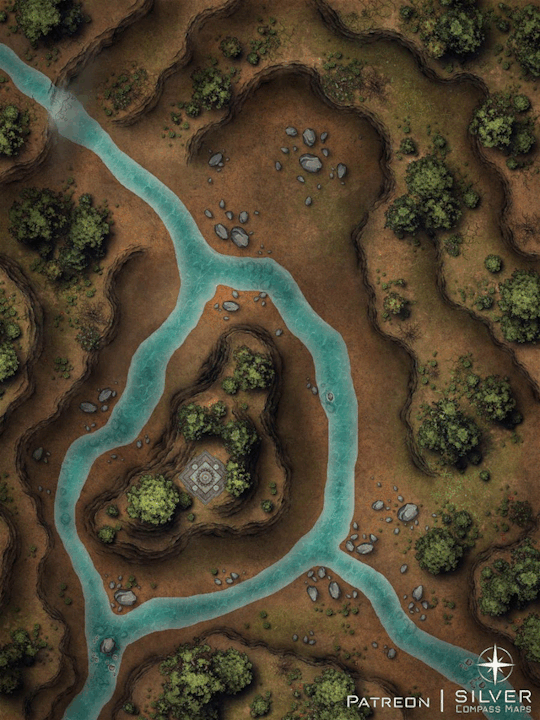
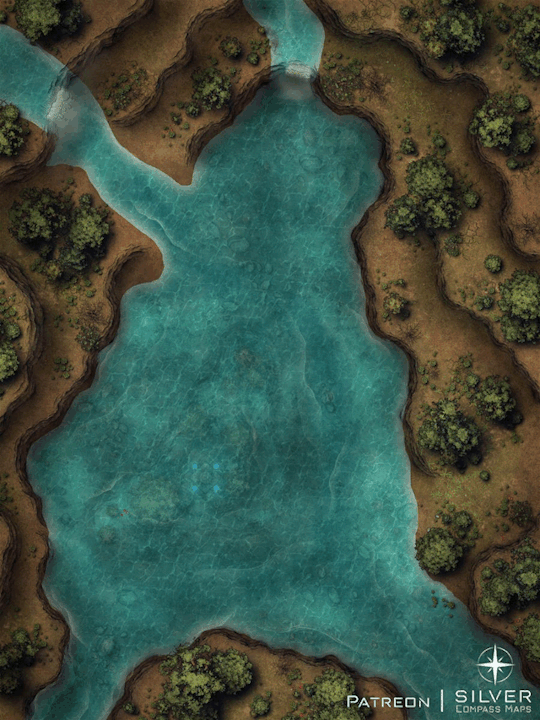
The Flooding Ravine
There is an entrance to a secret dungeon in the center of the map. Once the players set off a trap, then the ravine begins to flood with water. Can your players reach the entrance in time before the force of the water carries everyone away and seals off the entrance?
This map can also be played in reverse order. The players arrive to a flooded ravine and after solving a puzzle or defeating a monster, the ravine dries up and reveals the entrance to the temple.
All 7 phases of this map can be downloaded for free here.
If you want free maps mailed to you every month, sign up for my newsletter here.
#d&d#dnd#pathfinder#tabletop#ttrpg#cartography#dndart#fantasy map#battlemaps#battle map#dndmap#5e#shadowdark#osr
194 notes
·
View notes
Text
Milk Bar: my sci-fi RPG set in a post-Soviet Poland is now live on Kickstarter!
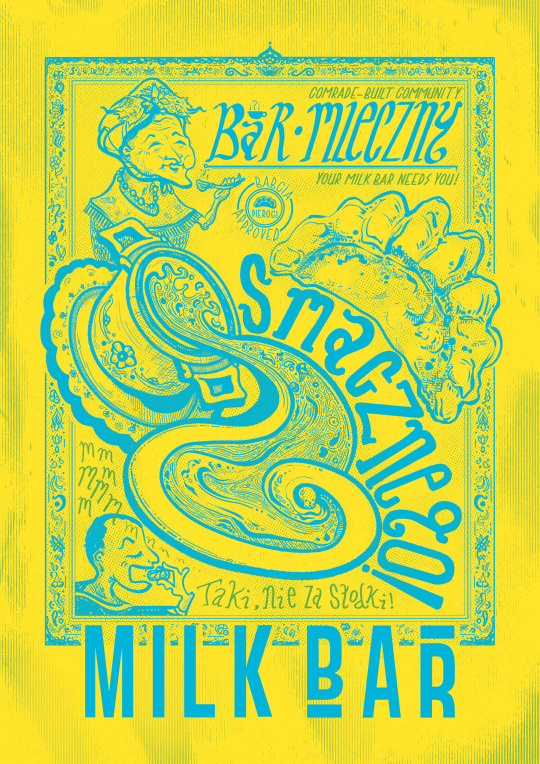
Hey folks!!
Milk Bar is a sci-fi tabletop roleplaying game set in an alternate-timeline, post-Soviet Poland. After the Soviets grew in power, their ultimate clash with Capital left your city in ruin. All you can do now is gather your fellow Communards, salvage whatever you can, and build your Milk Bar.
Based on RPGs like Cairn, Mausritter, and Mothership, and video games like Disco Elysium and Control, Milk Bar is a game about the post-collapse and rebuilding.
A 100-page book featuring:
Quick, simplified rules in the old school tradition
A toolkit for generating a retro-futuristic, alternate-timeline post-Soviet Communist Poland
Funnel Rules which have your group of upstart Communards find and take back a Milk Bar from the grasp of Capital. Start at level 0 and Cut Your Milk Teeth.
Unique progression system tied to basebuilding. Want to stitch up those wounds? You better build an Infirmary and find a Doctor
Abandoned Soviet Superstructures containing reality-bending Future Tech deep within
A Bestiary melding Polish and Slavic mythology with classic science fiction
Solo Rules. Become the Biggest Communism Builder of the year '24!
Gorgeous production values: high-quality, uncoated paper and an exposed, yellow thread binding. Full of graphic design work from Eryk Sawicki (me!) and art from SADGHOBLIN
Pierogi
211 notes
·
View notes
Text

We put SO MUCH work into the digital edition of Bones Deep. Glad to see that work paid off!
You can grab a copy for yourself here: https://www.technicalgrimoire.com/bones-deep
#tabletop#indie ttrpg#ttrpg#osr#indie#rpg#troika#skeletons#underwater#marine biology#review#accessibility#pdf
167 notes
·
View notes
Text
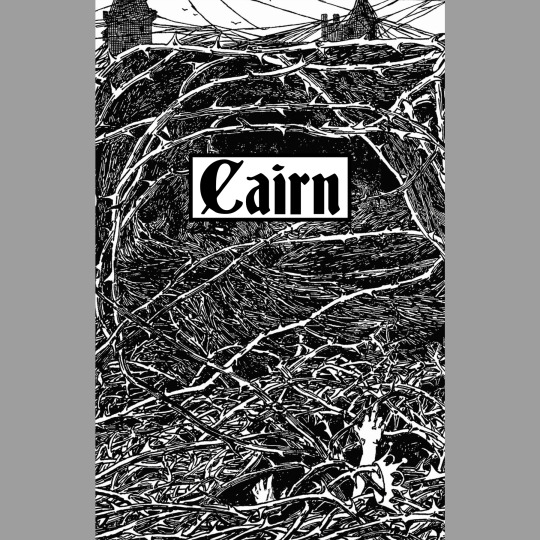
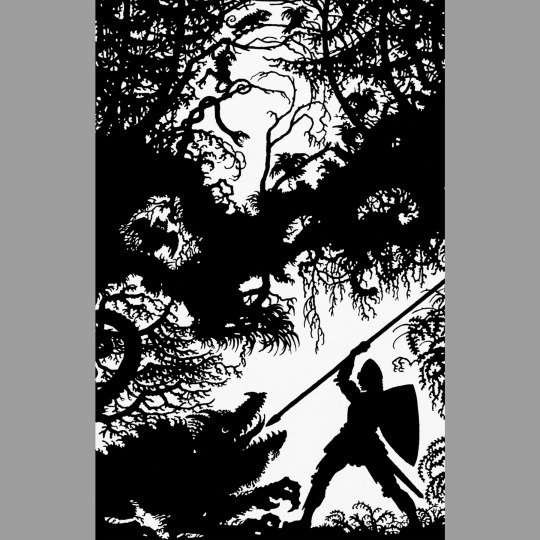

Cairn (2020) is a neat little skeletal OSR system, born in part out of Ben Milton’s Knave and Chris McDowall’s Into the Odd. Yochai Gal’s stated intent is to make something that allows Into the Odd to be used for OSR settings like Dolmenwood. The result is a fast, light, classless game that feels, in a sort of surprisingly non-specific way, like a D&D experience, without any of the usual headaches.
A lot of stuff actually reminds me of other non-D&D-based systems. Reducing attributes to three (Strength, Dexterity and Willpower) feels pretty Dungeoneer to me. The combat reminds me a bit of HeroQuest, actually. You roll your weapon die, subtract the opponent’s armor value and subtract the balance from their HP. HP is Health Protection, not traditional hit points. They can be restored with a brief breather and a swig of water. If they are reduced to exactly zero, the character gets a scar. Damage exceeding HP is taken out of Strength — once that is gone, the character is dead. Magic is similarly unusual, facilitated by scrolls and spellbooks that any character can read. Casting spells (which are leveless and extremely open-ended) costs fatigue, which is logged in inventory, which I think is an odd, but exceedingly clever, mechanic.
And that’s about it. Light, flexible, keyed to OSR experience without feeling particularly OSR in its mechanics. This is a great introductory system. Its flexibility has sparked a surprising creator community which has produced hacks and Cairn-specific adventures. Good stuff.
212 notes
·
View notes
Text

Some rapscallions from my ttrpg Black Powder and Brimstone. A rules light, art heavy grim-dark game based on the Mörk Borg system.
Dark and thrilling adventures await in a world blighted by war and demons.
This illustration shows a mercenary deserter, a ruthless adventurer, and a lapsed practitioner. Only three of over twenty character archetypes you can shoes from, or just make up your own!
You can pre sign up for the campaign here!
#illustration#ben tobitt#artists on tumblr#digital art#fantasy#rpg#kickstarter#osr#ttrpg#ttrpg art#horror#tabletop game
178 notes
·
View notes
Text
In reading Marcia's review of her experience with Shadowdark, I contemplated on how I run my own OSE games. This is also fresh on my mind because I am running Miranda Elkins' fantastic Nightwick. Its all about distilling things down to the interesting choice and eliminating the non-interesting one.
Basic Equipment: I am thinking about charging my players a flat rate for all basic dungeoneering equipment that is rolled into weekly expenses-- so 7sp a week for expenses plus ~3-5sp for pick of equipment
Not interesting: Cost of equipment, especially down to coppers
Interesting: Scarcity (what if there is no 50' rope this week?) and how many slots PC dedicates to basic equipment
Light: Due to torch cost and number per slot, it is easy to carry a lot of torches.
Not interesting: Carrying enough light to last 12-24 turns- easily done
Interesting: When torches extinguish-- like in the middle of a fight or when the goblins you are negotiating with get mad; how many hands in the party are occupied by torches
This is why I prefer to use the overloaded encounter die to simulate inopportune moments when a torch is snuffed out- gust of wind, dripping slime, bucket of sand thrown by a sneaky goblin. And with regards to hands, holding a torch potentially lowers AC, removes a weapon, or makes spell casting delayed (need both hands). One saving grace: torches are an improvised weapon that do 1d4 dmg and are on fire.
Stuck Doors: I now commonly interpret the 2-in-6 chance as a basic surprise roll. If they players fail it, they make a loud noise and alert anything on the other side of the door, but open it next round.
Not interesting: Rolling a d6 over and over again to see if PCs finally break down a door
Interesting: Seeing if PC get surprise on whatever is on the otherside; if additional equipment is brought to deal with doors
I usually like the idea that a crowbar allows and additional 1d6 rolled per individual with one.
Rations: This is similar to the situation with light, its easy to carry enough food/water for 2-4 hours which is more likely the time frame of a dungeon delve-- not a camping trip.
Not interesting: Tracking both food and water separately for nominal circumstances
Interesting: How many PCs carry rations; will rations be used for other things (like distracting monsters) or saved to avoid fatigue
For me the nature of rations are both food and water abstracted. So if a player want to use food as a distraction, mark off 1 rations. If a player wants to douse a small fire, use 2 rations as you frantically empty out a water skin and try to put out the fire consuming the spell book.
Secret Doors & Traps: Two dungeon features that are opposite sides of the same coin. Really I think Chris McDowall has written some of the best bits on this that boil down to "traps are puzzles" and not really "gotcha".
Not interesting: Situations where the PCs have to pick the exact right spot and roll a 1-2 in 6
Interesting: Adding in environmental clues or other sources of information that allows discovery by players investigating the fictional environment
Now, I will keep both rolls as a back-up for either PCs not having a good idea and/or a back-up for perhaps me being unable to convey the fictional environment properly in the moment.
Weapons: I've yet to find a really good way to do weapons simply outside of 1d6 damage for all types. I don't mind BX's variable weapon damage. And I do like some old rulesets sorta "first strike" if your weapon is larger than an opponents other wise smaller, lighter weapons strike first in subsequent arounds.
So here is what I have got so far: Using a weapon two-handed is a +1 to damage, using an off-hand weapon is +1 to-hit, and a shield is of course +1 AC. I do like that fighters with bows can shoot twice if they did not move and the "cleave" ability.
Not interesting: Weapon factors that are so extensive they require a separate rules discussion, trigger player obsession, and/or orient the whole of gameplay to combat
Interesting: What PCs chose to do with their hands: more armor, more weapons, or more light
So that is it for now, if you'd like to see more of my house rules here is my post on the Serpent Song Hymnal. I hope to have a sorta player version created sometime soon but I'm still trying to dial-in what my go-to "french vanilla" D&D is like.
#ttrpg#ttrpg community#indie ttrpg#OsR#old school renaissance#OSE#old school essentials#Game philosophy
110 notes
·
View notes
Text
Won’t Someone Think of the d100 Polearms?
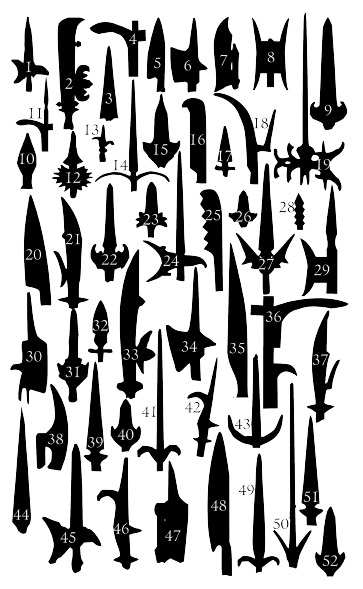
Won’t Someone Think of the d100 Polearms? is a free toolkit for crafting unique polearms for use in tabletop roleplaying games. It is system neutral, and it will be up to you to assign stats that make sense for the polearms in your system of choice.
In this toolkit you will find three tables to roll on to create a polearm:
1. A table of 100 blade designs based on historical polearms!
2. A table of 100 special qualities (Angry, Wise, Invisible, Cabbage)!
3. A table of 100 (mostly) decorative shafts!
Now, go forth and fill your games with a bounty of the most useful yet most underappreciated type of weapon ever to grace the pages of our hobby!


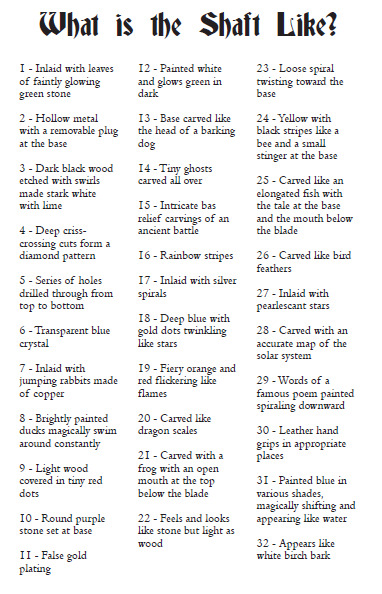

631 notes
·
View notes
Text
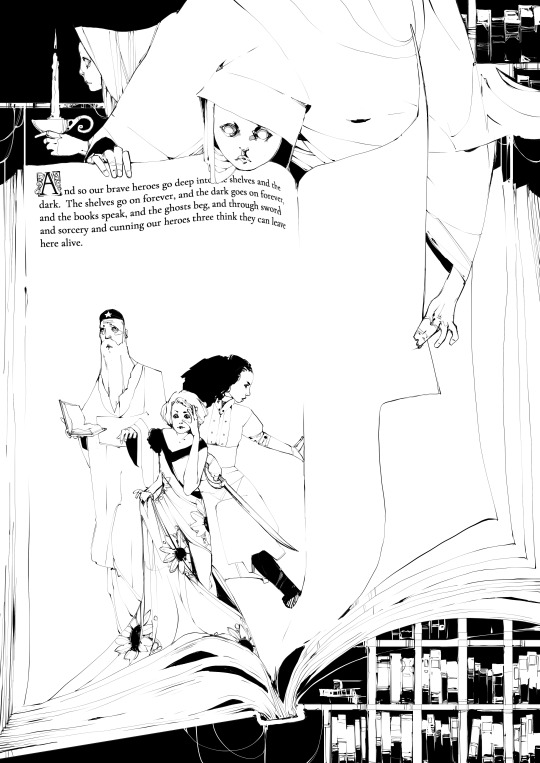
194 notes
·
View notes
Text
making a necromancy system for Iron Halberd
i've been mulling over ideas for a whole necromancy subsystem, separate from spells (bringing the total number of different magic systems in this game up to 4). mostly for self-indulgent reasons - it's a way to codify a lot of stuff about necromancy that i've used in my worldbuilding before, but always struggled to work into the mechanics.
Necromancy is easy. why? because i want it to have a seductive-power-of-the-dark-side thing going on. if you meet a necromancer, they can teach you to reanimate undead in a few minutes. anyone can do it. it's a temptation - one that's easy to say yes to, but hard to go back on.
accepting these teachings and applying them in an easy ritual grants you the power to reanimate undead, but costs a point of your stamina or vitality - and you can't undo that without some sort of holy magic cleansing you of it. you're a necromancer now.
Necromancy is powerful, and unreliable. when you reanimate an undead, you always succeed. there's a roll involved, but that roll determines whether you control the resulting undead, not whether it's animated in the first place. the difficulty for this roll goes up every time you reanimate something, and goes down a little bit each time you rest; it also can't go lower than the total hit dice of all undead under your control.
Necromancy fills the world with dangerous undead. undead created that you don't control are a problem. they'll usually try and eat you, and if you leave them wandering, they'll probably eat someone else instead. using necromancy brings these hideous monsters into the world and your control over them is fragile. even if you're determined to use your powers for good, your mistakes could cost innocent lives. and i love necromancy working like that. it's much more interesting to me than it just being ontologically evil for objective reasons.
i ended up removing the roll-to-cast system from iron halberd a while ago in place of way more reliable spells, because we didn't find roll-to-cast all that fun, but for necromancy it feels too appropriate to pass up. i want it to be something even the necromancer themselves is afraid of. here's the rules i drafted up:


178 notes
·
View notes